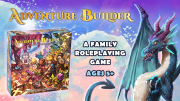Transmissions (CrossCut Games) – The board is placed in the center of the table and the four robots are placed on it. On your turn you must move one of the robots by playing a card. A card will either show a robot, in which case you move that specific robot, or a location, in which case you must move a robot from that location. Robots move clockwise around the board and skip over spaces occupied by other robots. You then take the action of the location where the robot ends his movement. Possible actions include drawing cards, taking engrams, earning electricity, spending engrams to acquire items or a pipe tile, or using electricity to buy ideas. Each player has a player board in which they can give each robot different idea cards which allow them different special abilities. Players use pipe tiles to build a pipe system, connecting the pipes together. Players earn points at the end of the game for their pipe systems, ideas, items, and cards.
Casual Games on Kickstarter: Robots, Scrappers, and Cyberpunk

There’s a lot of science fiction on Kickstarter this month, from adorable robots and a racing game with a modular board to a cyberpunk card game of upgrades and DNA. For those less interested in sci-fi themes, there are also peaceful gardens, horse racing, word puzzles, and a RPG game for families.
Scrap Racer (Queen Games) – You start each game by building the modular race track and picking your racer, each of which has a unique ability. On your turn you roll a die and then either choose to roll another one or stop rolling. The more dice you roll the farther you move, moving one space for the combined value you roll. However, if you roll a pair you crash and draw a crash card which will have a negative effect. The higher the value of the pair the more dangerous the crash card that you draw. If you land on a space with another player, both players roll a die and the higher number wins, sending that player forward one space. You can also collect bonus tiles from landing on certain spaces on the board which can in turn help you to manipulate your dice rolls. Each time you cross the finish line you draw a token, and the first player to collect three tokens wins the game.
Vowl: The Game of Letters Gone Astray (BGB Publishing) – Each turn you roll your dice to determine how many basic cards you draw to form your deck. You then draw extra cards based on how many points you have. The timer starts running and you attempt to work through all the cards in your deck, either trying to beat the timer or finish before an opponent, depending on which game mode you select. Each card shows a word but with all the vowels removed. You must figure out what the word is in order to complete a card. Some cards can have multiple possible answers. Players start the game with their victory marker at one end of the board and their scoring marker at the other end. When you win a round, you choose how to score. You may either advance your scoring marker two spaces or move everyone’s victory markers back one space. The first player to have their scoring marker reach their victory marker wins the game, however the farther along your scoring marker is on the board, the more difficult the cards you have to solve each round.
Koi Garden (B & B Games Studio) – Each round you choose a land card from the marketplace and place it onto your exiting pond so that one section of it covers at least one other section of your pond but is not completely covering it. Your current wildlife card will have instructions for scoring and moving that animal through your pond. You then swap your wildlife card with the one that is in the same column in the marketplace as the tile that you took. Animals will stay in your pond acting as an obstacle until you control their cards again. The player with the most points at the end of the game wins.
Long Shot: The Dice Game (Perplext) – In this roll-and-write game, each turn you roll the dice which determine which horse moves forward on the track and how many spaces. However, each horse has at least one other horse marked on its card. When a horse is rolled, all horses marked on its card also move forward one space. Then each player chooses an action such as betting on the horse that was just rolled, marking off a number on their concession stand in order to eventually unlock special abilities, buy the horse that was rolled (which also comes with a unique ability), or mark off the rolled horse's jockey helmet or jersey in order to keep the ability to bet on that horse even once it's close to the finish line or to mark off another horse on the rolled horse's card. The game ends once three horses have crossed the finish line. Players earn points for owning the winning horses, for having marked off matching sets of jockey helmets and jerseys, for betting on the winning horses, and for any money they have left over. You can read our preview of Long Shot here.
Rivet Heads (New Mill Industries) – In this cyberpunk themed card game, players manage an assembly line of cards while purchasing upgrades for their squads. At the start of the game, each player is dealt a squad card which lists which upgrades they need for each squad member. A line of upgrade cards is placed in the center of the table and each player is given a board on which to track the different resources/upgrades in the game. At the start, player tokens are randomly drawn and players take turns placing their token on an upgrade card in the current display, claiming that card for themselves. After everyone has claimed a card, a new display is dealt out for the next turn. On future turns, players take turns based on the position of their tokens in the display from left to right. On your turn, you move the card you claimed down to your assembly line, placing it in the number one slot. You then activate all three slots. Each upgrade card shows what resource you have to spend for it and what resources you gain in exchange. You then shift all the cards down your assembly line, discarding the one in the third slot. Finally, you end your turn by placing your token on a card in the display dealt for the next turn. The upgrade deck evolves as the game continues, focusing more heavily on different types of resources, so players must plan accordingly. Players earn points at the end of the game based on how many of their squad's requirements they fulfilled and who has the most of each resource.
Adventure Builder (Wider Path Games) – Adventure Builder is an RPG game designed for families and kids. One person is the guide who creates the adventure using a deck of cards. Cards include creatures, encounters, and story cards. Cards are laid out in groups, with each set representing a different location. The other players create their characters by assigning ten points to four different traits. During an encounter, players roll a die and can then spend trait points in three of these trait categories in order to raise the result. The fourth trait can only be spent on another player's turn to raise the result for them. Players start at one location and reveal cards one at a time until they find a story card which allows them to choose when to move forward to the next location. Players do not level up their characters between games, rather characters become stronger by buying equipment with gold they get for defeating creatures or resolving treasure cards. You can read our preview of Adventure Builder here.
Disclosure: unless otherwise noted, we have not seen or played any of the above games. Our assessment of each is based on the information given on the crowdfunding project page.




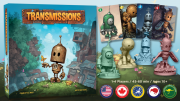
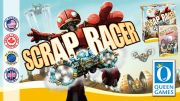
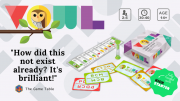
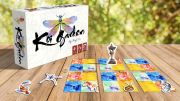
_large.jpg)

